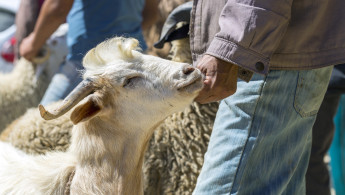In Morocco, skyrocketing prices ferments rage ahead of Eid Al-Adha
In Morocco, the skyrocketing prices have dampened Eid Al-Adha's ambience as Moroccans struggle to afford basic commodities.
The Moroccan markets have recently witnessed a massive wave of price increases impacting most food items, mineral water, building materials, herd fodder, school books, and fuel prices.
The rise in the prices of fodder is expected to affect the cost of the sacrifice - which is usually a sheep, a goat or a buffalo - that Muslim Moroccans "offer to God" every year in celebration of Eid Al-Adha.
Celebrated in July this year, Eid Al-Adha commemorates the story of Prophet Abraham when he was commanded by God, in a form of a dream vision, to sacrifice his son, Ishmael. While he was in the act of sacrificing his son, God sent the Angel Gabriel with a huge ram to inform Abraham that his dream vision was fulfilled as he instructed him to sacrifice the ram as a ransom for his son.
Named Eid Lkbir (the biggest feast) in Morocco, the sacrifice feast represents a vital social and traditional event for most Moroccan households who take much pride in the size and the quality of their sacrifice.
"Eid [Al-Adha] is an opportunity to give to God and to others. But this Eid I do not think I will be able even to afford it for my children. The prices continue to increase every day," Saeid, a Moroccan construction worker, told The New Arab.
Moreover, the feast is the main opportunity for several poor households to afford meat for their children. The relatively high prices of meat (70-75 Moroccan Dirhams = US$7 to 7.5) in the Moroccan market force many Moroccan families to rely only on vegetables, certain types of seafood and chicken for the rest of the year.
As the Eid looms, the skyrocketing prices of livestock nearing 10,000 Moroccan Dirhams (US$1,000) that surfaced on local websites prompted concerns among Moroccan breadwinners, who mostly are paid less than 5000 Moroccan Dirhams (US$500) a month.
"I am a teacher in a public school but all that I make monthly is 5,000 Dirhams. I will not be able to afford Eid this year due to all the increasing costs. My children understand. But I still feel bad for not being able to afford something basic like that for them," Mouhcine, a Moroccan teacher, said to The New Arab.
However, the Moroccan government confirmed Saturday that the prices of sheep and goats in the national livestock markets are at the same levels as the previous agricultural season during the Eid Al-Adha period.
"The measures to protect the livestock within the framework of the program to mitigate the effects of the lack of rain precipitation launched by the King in February 2022, as well as the improvement of pastoral and fodder resources since March, have made it possible to improve the situation of the live animal market compared to the situation before February," said the Moroccan ministry of agriculture in an official communiqué published over the weekend.
Meanwhile, the Moroccan government attributes the continuing increases in goods to the severe drought that struck the country this agricultural season, as well as to the covid-hit international economy and the Russian war on Ukraine.
Nevertheless, the economic hardship continues to fuel the social anger against the current Moroccan government that promised a social state at the start of its term in October last year.
The Moroccan Prime minister Aziz Akhannouch, a businessman who has played a key role in Moroccan governments since 2007, remains the centre of controversy because of his large investments in energy companies, mainly Afriquia Gas, the biggest distributor of fuel in the Kingdom.
Fuel prices reached US$1.6 to 1.7 this week driving hundreds of citizens to call for the resignation of PM Akhannouch via social media, meanwhile thousands of employees are expected to strike today Monday in protest of Akhannouch's policies facing the crisis.





 Follow the Middle East's top stories in English at The New Arab on Google News
Follow the Middle East's top stories in English at The New Arab on Google News


